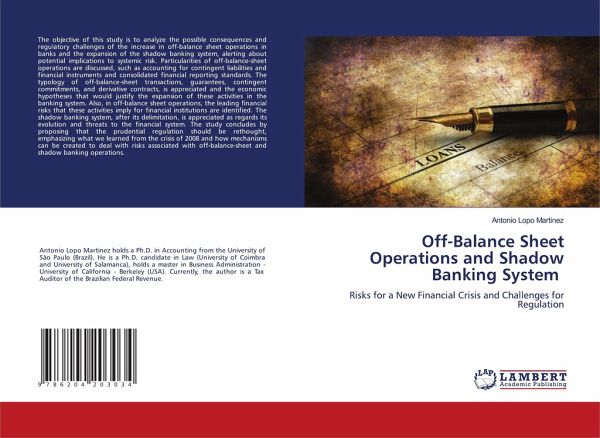
Off-Balance Sheet Operations and Shadow Banking System
Risks for a New Financial Crisis and Challenges for Regulation
Versandkostenfrei!
Versandfertig in 6-10 Tagen
18,99 €
inkl. MwSt.

PAYBACK Punkte
9 °P sammeln!
The objective of this study is to analyze the possible consequences and regulatory challenges of the increase in off-balance sheet operations in banks and the expansion of the shadow banking system, alerting about potential implications to systemic risk. Particularities of off-balance-sheet operations are discussed, such as accounting for contingent liabilities and financial instruments and consolidated financial reporting standards. The typology of off-balance-sheet transactions, guarantees, contingent commitments, and derivative contracts, is appreciated and the economic hypotheses that woul...
The objective of this study is to analyze the possible consequences and regulatory challenges of the increase in off-balance sheet operations in banks and the expansion of the shadow banking system, alerting about potential implications to systemic risk. Particularities of off-balance-sheet operations are discussed, such as accounting for contingent liabilities and financial instruments and consolidated financial reporting standards. The typology of off-balance-sheet transactions, guarantees, contingent commitments, and derivative contracts, is appreciated and the economic hypotheses that would justify the expansion of these activities in the banking system. Also, in off-balance sheet operations, the leading financial risks that these activities imply for financial institutions are identified. The shadow banking system, after its delimitation, is appreciated as regards its evolution and threats to the financial system. The study concludes by proposing that the prudential regulation should be rethought, emphasizing what we learned from the crisis of 2008 and how mechanisms can be created to deal with risks associated with off-balance-sheet and shadow banking operations.












